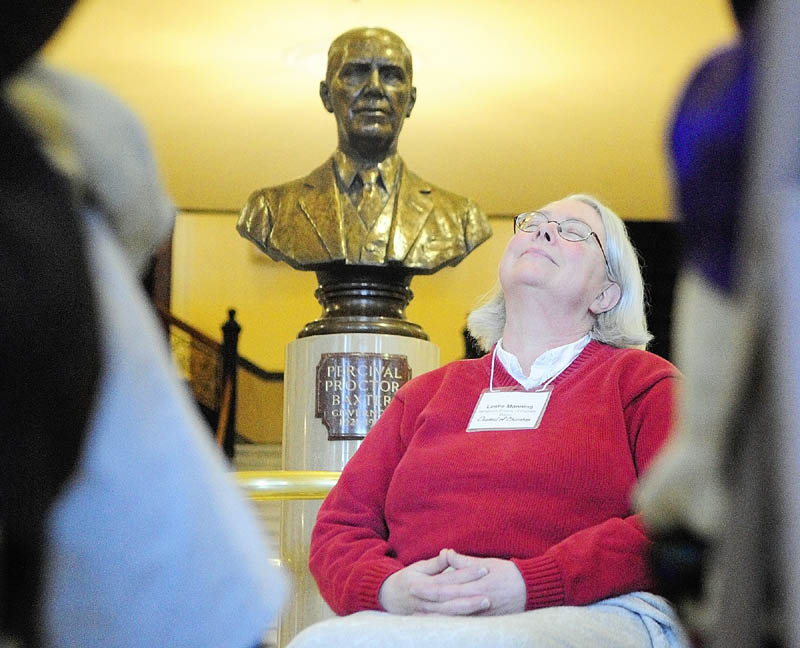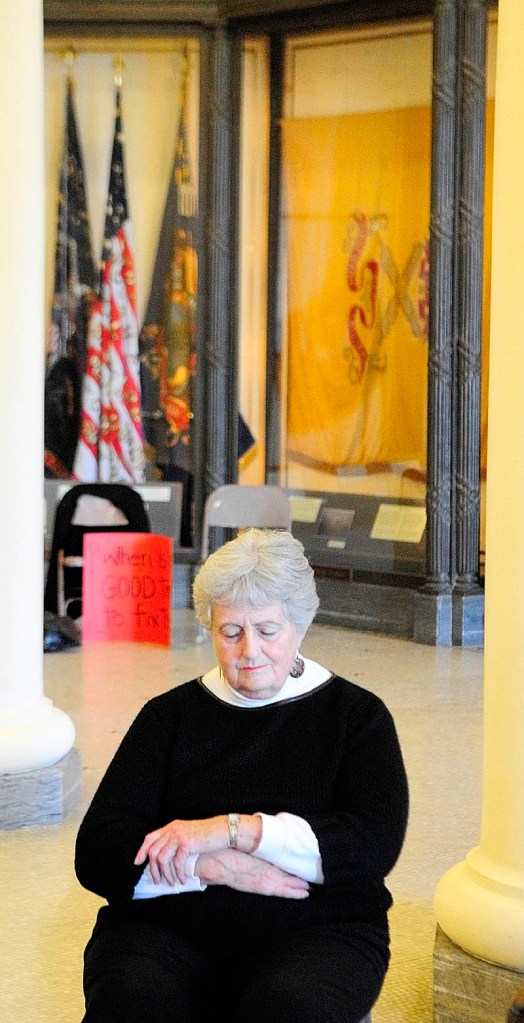To the best anyone could recall, it was a first for the Maine Council of Churches: Throughout last week’s three-day public hearing on Gov. Paul LePage’s proposed cuts to MaineCare, dozens of people took a few minutes — or a few hours — to sit down in a corner of the State House and pray.
“We really felt this was an extraordinary circumstance,” explained Leslie Manning of Hallowell, president of the council’s board of directors. “And it really required an extraordinary response.”
It didn’t go unnoticed.
Between 9 a.m. Wednesday and 5 p.m. Friday, 362 Mainers signed up to address the joint gathering of the Legislature’s Appropriations and Health and Human Services committees.
From parents of children with disabilities to children of parents with Alzheimer’s disease, almost all of them begged lawmakers to rebuff LePage’s attempt to trim $220 million from MaineCare, the state’s Medicaid program. And while the regular witnesses came armed with their customary statistics and spreadsheets, many others brought a much simpler message.
“Please, help us,” begged Dave Neverland of Benton, moments after he gave up on his hand-printed statement Wednesday and simply spoke from the heart.
Neverland, 60, had never been to the State House before. Neither had his wife, Cindi, 56, who stood by his side while the legislators listened in rapt attention.
The Neverlands are both disabled — Dave has mental illness and severe dyslexia; Cindi was injured in a car accident and suffered a stroke last summer.
They get by on a total of $1,570 per month in Social Security disability benefits and would have virtually no access to health care if not for MaineCare’s Qualified Medicare Beneficiaries program, which helps pay their co-payments, deductibles and other expenses.
“We don’t have the Internet. We don’t have extras like cable,” said Cindi in an interview outside the hearing room. “The cellphone we have, my dad pays for because he was afraid when I had the stroke that we wouldn’t be able to get ahold of a doctor.”
She added, almost apologetically, “I mean, we do have a car. And we buy our groceries — we don’t do food stamps.”
They came only because Dave bought a newspaper a few days earlier (“We can’t afford one most of the time,” he said), saw that their collective $300-per-month MaineCare benefits were in peril and decided for once they’d make their voices heard.
They succeeded. Two days later, some lawmakers were still recalling Dave’s impassioned plea.
But what the two committees didn’t hear — Dave went off-script before he got to it — was how the Neverlands view themselves in this increasingly perilous political and economic climate.
“I was going to tell them to take all of us useless people out front here and just shoot us. That’s my solution,” Dave said, his voice breaking. “Then we won’t be a burden to them. That’s the way it makes you feel.”
Finally, he broke down in tears. Cindy did her best to comfort him.
“These people are aliens to me,” Dave said, looking around the State House. “I don’t understand them.”
With that, Dave and Cindi walked arm-in-arm toward the marble stairway.
“You did good,” Cindi told her husband over and over. “You did good.”
Down the hallway, the prayers went on.
“We want (lawmakers and state officials) to know we’re here,” said the Rev. Jill Job Saxby, executive director of the Maine Council of Churches. “We want them to know that people of faith are watching.”
It’s actually a two-pronged message.
There’s the practical: To those who think the churches and other non-religious charities can catch all of the 65,000 MaineCare recipients about to slip through the social safety net, Saxby suggested, stop by your local food pantry and see what, if anything, is left on the shelves at the end of each week.
“The need out there is just exploding right now,” Saxby said. “Private churches and charities, we believe, need to be part of the mix. But we can’t begin to meet all the need.”
Then there’s the philosophical message, one not often heard in a place know more for politics than soul searching: Posted just outside the circle of chairs in the State House Hall of Flags was a sign that beckoned, “Prayer Vigil for a Moral Budget.”
Some surely would scoff at the notion of a budget process driven by, of all things, morality. In an appearance Thursday evening on the Maine Public Broadcasting Network’s “Maine Watch” program, Lance Dutson, chief executive officer of the conservative Maine Heritage Policy Center, called the three-day hearing a “circus.”
But beyond such shallow-minded demagoguery, is there in fact a moral element here? As they now descend into the weeds of line items and work sessions, how focused should lawmakers be not just on vote counts, but also on what is fundamentally the right thing to do and what would be morally reprehensible?
“I went home Wednesday night and I felt this mixture of anger and shame,” said Rep. Peggy Rotundo, D-Lewiston, the ranking minority member on the Appropriations Committee. “How can we be in this position where people are coming before and pleading with us to continue services that are literally keeping some of them alive?”
Rep. David Webster, D-Freeport, another committee member, said with all the talk these days about running government like a business, one important distinction is being lost. When times get tough for a business, he noted, you focus on those products and customers that are most profitable and, as necessary, you jettison the loss leaders.
“But if you’re in government, you can’t do that,” Webster said. “You can’t say, ‘These people don’t produce enough for me, so they’re not going to be my customers anymore.’ That’s OK in business because it’s your job. But it’s not OK in government.”
Over on the Republican side, Appropriations Committee Co-Chairman Rep. Patrick Flood, R-Winthrop, said the emotional tenor of last week’s hearings was rooted in the simple fact that LePage’s proposed supplemental budget cuts exclusively target the Department of Health and Human Services.
That said, Flood added, “There’s a moral element to everything we do that deals with people.”
Sen. Richard Rosen, R-Bucksport, the other appropriations co-chair, took a more nuanced view.
The LePage administration, Rosen said, “is essentially saying, ‘I’m fulfilling my moral obligation by funding what I think is the core of the (MaineCare) program'” and not funding the rest.
“That’s their view,” Rosen said. “My personal view is that is’s all about transition. You have to be able to answer the question, ‘OK, they are here. They are getting the service. Is there an obligation to at least provide … a transition for these people if in fact these proposals are adopted?’ “
Smiling, Rosen added, “I don’t know if that’s a moral obligation. I do think it’s a practical obligation.”
Whatever it is, it kept people coming to the prayer circle right up until the final gavel late Friday afternoon. And it kept many a legislator — both Democrats and Republicans — stopping by to quietly thank the group for its effort.
Denise Dreher of Biddeford, state coordinator for Pax Christi Maine, the local chapter of the international Catholic ecumenical and interfaith pacifist movement, was among the last to take a seat, fold her hands in her lap and close her eyes.
Did she plan to go inside the hearing room and testify while there was still time?
“No,” Dreher replied said with a slight shake of her head.
Closing her eyes once again, she quietly added, “This is my testimony.”
Copy the Story LinkSend questions/comments to the editors.




Success. Please wait for the page to reload. If the page does not reload within 5 seconds, please refresh the page.
Enter your email and password to access comments.
Hi, to comment on stories you must . This profile is in addition to your subscription and website login.
Already have a commenting profile? .
Invalid username/password.
Please check your email to confirm and complete your registration.
Only subscribers are eligible to post comments. Please subscribe or login first for digital access. Here’s why.
Use the form below to reset your password. When you've submitted your account email, we will send an email with a reset code.